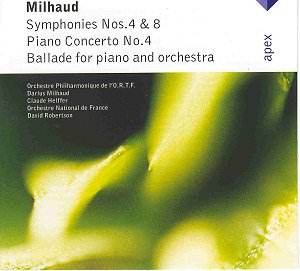Warners show increasing acuity
of judgement as they continue to roll out Apex, their bargain
price marque. In the same month that they issued a matchless historic
Martinů collection (ex-Supraphon) comes this Milhaud compendium
with two symphonies conducted by the composer.
The two composers
have some similarities at least at superficial level. Both were
prolific. Both wrote five piano concertos. Both came to the symphony
in the early years of the Second World War. Both spent many sunny
years in the USA - Milhaud longer than Martinů. That
said Milhaud's world is quite different, less bejewelled and more
athletically unadorned than Martinů's.
Dedicated to Roger Désormière and
commissioned for the centenary of the 1848 Revolution the Fourth
Symphony is uproarious, a faithful reflection of the revolutionary
spirit both in its elevation and its clamorous brutality. Milhaud
is not afraid of using dissonance but the melodic element is never
lost. Ivesian rebellion is rife in the feral finale which is riven
and rent by blasting and raucous energy - rather like a Walton
march but one in which the composer allowed ideas to flow and
flood over each other. Some of it sounds like a Havergal Brian
symphony perhaps like the Ninth or the Twenty-Second. There is
no doubt at all that this is a piece with the grandest of pretensions
and with consummation to match.
The Eighth celebrates the Rhone - hence
Rhodanienne. The composer had in mind Smetana's Vltava
(Die Moldau) but his tracing of the great river from Alpine
spring to the majestic Mediterranean is painted in the raging
and imperishable colours of dissonance. There is some rest but
not much. Try the second movement for peace and the third for
the unstoppable surge and flood of the river.
The performances by the elderly composer suggest
that Milhaud was vital and inventive well into old age. The recordings
still sound good with some allowance being made for a tendency
towards treble emphasis.
The Fourth Piano Concerto was written
for Sadel Zkolowsky who premiered it with Munch and the Bostonians
in 1950. He finds time for romantic graces amid the pell-mell.
Probing soured Gabrieli brass writing rattles cages in the Très
lent middle movement which is followed by a jazzily piquant
and gracious Joyeux (echoes of his famous Scaramouche).
Claude Helffer is the excellent soloist who is on his toes throughout.
The Ballade has much in common with other of his 'Brazilian'
works including Saudades do Brasil and Le boeuf sur
le Toit. There are moments too when you can hear similarities
with Lambert's Rio Grande and with the jungle pieces by
Villa-Lobos and Koechlin. I wonder if Lambert ever conducted this
deliciously fantastic piece. It is dedicated to Roussel.
Good brief liner notes in English, French and
German.
Generosity cannot be faulted: full to the brim.
A rewarding Milhaud collection. If you enjoy it you can consider
the complete (12) symphonies on CPO or the complete string quartets
on Naïve.
Rob Barnett
